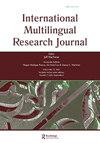教师对多语言学习者的信念:语言意识形态如何影响教师的假设决策
IF 2.1
1区 文学
Q2 EDUCATION & EDUCATIONAL RESEARCH
引用次数: 3
摘要
摘要教师的语言意识形态决定了他们的课堂语言决策,而课堂语言决策又决定了学生的学习机会。因此,对语言意识形态的关注对于寻求支持职前和在职教师成为支持多语言政策制定者的教师教育工作者至关重要。这项基于调查的混合方法研究探讨了亚利桑那州一所大型公立大学134名在职教师的语言意识形态和假设决策。它采用决策树模型来研究参与者的人口统计、语言意识形态和他们围绕西班牙语-英语双语教育(DLBE)的假设决策之间的联系。研究结果显示,当前和未来的教育工作者之间存在交叉点:(a)情境化的经验,(b)准确讨论DLBE的能力(没有误解),以及(c)具体参与围绕DLBE的假设政策制定细节的能力。这项研究提供了一个独特的视角,可以考虑职前和在职教师教育如何帮助教师准确理解DLBE/多语制、语言意识形态立场和语言多样性立场。本文章由计算机程序翻译,如有差异,请以英文原文为准。
Teacher beliefs about multilingual learners: how language ideologies shape teachers’ hypothetical policymaking
ABSTRACT Teachers’ language ideologies shape their classroom language policy-making, which in turn shapes students’ opportunities to learn. Attention to language ideologies is therefore critical for teacher educators who seek to support pre- and in-service teachers in becoming pro-multilingual policymakers. This mixed methods, survey-based study explores the language ideologies and hypothetical policy-making of 134 pre- and in-service teachers at a large public university in Arizona. It employs decision tree models to examine connections between participants’ demographics, their language ideologies, and their hypothetical policymaking around Spanish-English dual-language bilingual education (DLBE). Findings show intersections between current and future educators’: (a) contextualized experiences, (b) ability to discuss DLBE accurately (without misunderstandings), and (c) ability to engage concretely with details of hypothetical policy making around DLBE. The study offers a unique vantage point from which to consider how pre- and in-service teacher education can inform teachers’ accurate understandings of DLBE/multilingualism, language ideological stances, and stances toward linguistic diversity.
求助全文
通过发布文献求助,成功后即可免费获取论文全文。
去求助
来源期刊
CiteScore
4.10
自引率
4.80%
发文量
19
期刊介绍:
The International Multilingual Research Journal (IMRJ) invites scholarly contributions with strong interdisciplinary perspectives to understand and promote bi/multilingualism, bi/multi-literacy, and linguistic democracy. The journal’s focus is on these topics as related to languages other than English as well as dialectal variations of English. It has three thematic emphases: the intersection of language and culture, the dialectics of the local and global, and comparative models within and across contexts. IMRJ is committed to promoting equity, access, and social justice in education, and to offering accessible research and policy analyses to better inform scholars, educators, students, and policy makers. IMRJ is particularly interested in scholarship grounded in interdisciplinary frameworks that offer insights from linguistics, applied linguistics, education, globalization and immigration studies, cultural psychology, linguistic and psychological anthropology, sociolinguistics, literacy studies, post-colonial studies, critical race theory, and critical theory and pedagogy. It seeks theoretical and empirical scholarship with implications for research, policy, and practice. Submissions of research articles based on quantitative, qualitative, and mixed methods are encouraged. The journal includes book reviews and two occasional sections: Perspectives and Research Notes. Perspectives allows for informed debate and exchanges on current issues and hot topics related to bi/multilingualism, bi/multi-literacy, and linguistic democracy from research, practice, and policy perspectives. Research Notes are shorter submissions that provide updates on major research projects and trends in the field.

 求助内容:
求助内容: 应助结果提醒方式:
应助结果提醒方式:


